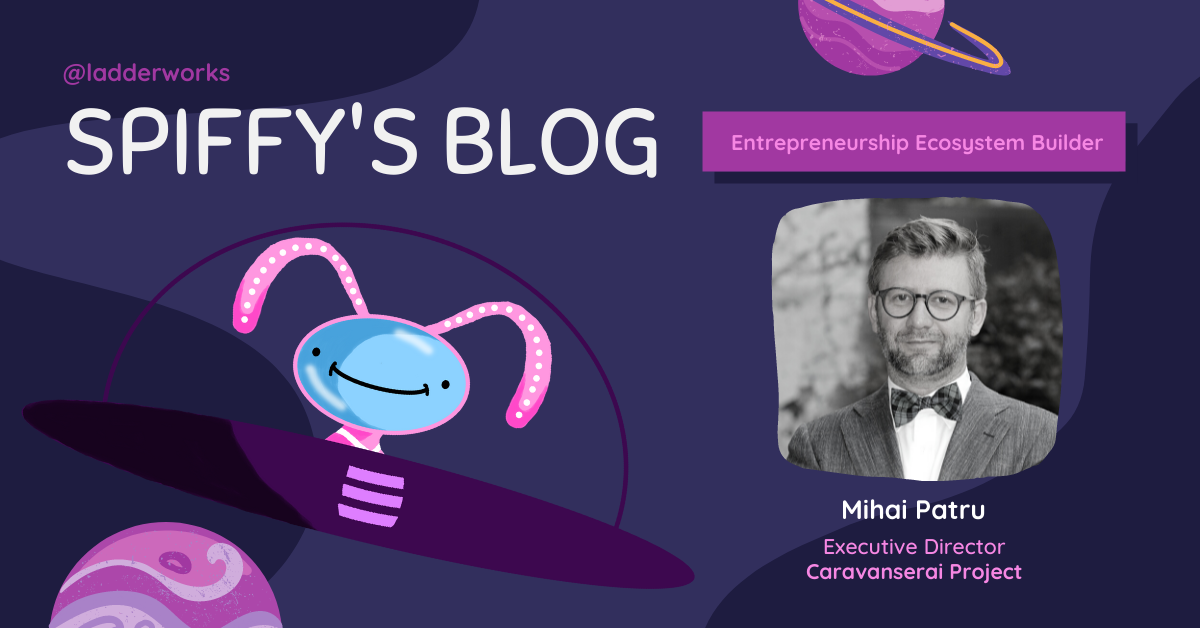Mihai Patru: Unique Capacity Building for Mission-Driven Leaders and Ventures
 Hi everyone, Spiffy here, your one and only interplanetary journalist reporting from Planet Earth. I’m thrilled to be talking to Mihai Patru, executive director of Caravanserai Project, who is helping to create an entrepreneurship ecosystem that accelerates and supports social ventures. Let’s see how he’s doing it!
Hi everyone, Spiffy here, your one and only interplanetary journalist reporting from Planet Earth. I’m thrilled to be talking to Mihai Patru, executive director of Caravanserai Project, who is helping to create an entrepreneurship ecosystem that accelerates and supports social ventures. Let’s see how he’s doing it!
Spiffy: Welcome, Mihai! It’s wonderful to meet you. Can you start by explaining the challenges you’re addressing through your work at Caravanserai Project?
Mihai: It’s a pleasure to be here, Spiffy. Everyone knows that being an entrepreneur is not just a long-term commitment to a mission and a vision but also a lonely journey. Caravanserai Project was established to turbo-charge entrepreneurs driven by a social impact mission and support them along their journeys. Making sure that they have the right support to build strong and sustainable ventures is key in their effort to generate systemic change. Most often, these entrepreneurs focus on their mission and pay less attention to their infrastructural needs. Through our programs, these change-makers—whether they are early-stage or more advanced—have access to technical support focused on financial sustainability, strategic planning, digital tools, human resources, and leadership.
Spiffy: Just what entrepreneurs need! What motivated you to work on this?
Mihai: From our own experiences as entrepreneurs we have learned firsthand how important it is to surround yourself with a reliable support system and develop ventures that are sustainable and future-thinking. Caravanserai Project has supported over 40 early-stage entrepreneurs since 2018 and more than 500 organizations attended our other capacity-building programs in 2020-2021. Witnessing their growth and seeing the shifts in how they approach their work continues to motivate us to develop unique resources and innovative tools that will help them advance their missions and stay relevant in their sector.
Spiffy: Can you talk about how Caravanserai Project is working to make the world more equitable?
Mihai: I’d be happy to, Spiffy. Supporting social impact entrepreneurs and mission-driven ventures is part of our contribution towards a more equitable world. Yet, it is not enough. Caravanserai Project is very specific about the way it designs its programs. Our long-term goal is to establish and develop networks of entrepreneurs that will continue to exist once our programs are over. We strongly believe in the power of networks and support systems as a tool to continuously energize change-makers and create an ecosystem they can always rely on whenever they need. Building a more equitable world does not happen overnight and it is not the result of a week-long effort. It requires continuity, consistency, and collaboration.
Spiffy: Can you share about an initiative or milestone that you’re really proud of and the type of impact it will have?
Mihai: Since 2016, when Caravanserai Project was founded, we have steadily grown as an organization, especially when it comes to the projects that we have developed and the programs we have designed. When the SEED Lab pre-accelerator was launched in 2018, we never thought it would be so impactful. Currently, it is hosted by the University of California Riverside Extension. The fourth cohort will start this October and bring together impressive early-stage social entrepreneurs from Southern California. There is no doubt that the nearly $1 million Wells Fargo Open For Business Grant that Caravanserai Project received, represents an important development and is a sign of appreciation and confidence in our vision.
Spiffy: No doubt about it! Can you talk about a project you’ve worked with that exemplifies the impact you’re striving to make?
Mihai: Caravanserai Project has had the privilege of supporting nearly 40 early-stage social impact entrepreneurs from Southern California as part of the eight-month SEED Lab pre-accelerator. The program turbo-charges social impact entrepreneurs and ventures from historically marginalized communities in the region, and other change-makers, with limited access to resources. We have worked with entrepreneurs tackling various issues including: mentoring high school students in foster care (The Seed Program), reimagining the way victims of sexual trafficking are assisted and reintegrated into society (Magdalena's Daughters), aging and technology awareness (Yohocare), supporting formerly incarcerated men (Advancing Steps), and much more.
Spiffy: Before we sign off, is there anything else you would love to tell our audience?
Mihai: One of the questions we get is about the name of our organization, Caravanserai Project. The caravanserais [kar-ah–van–se-ray] were well known meeting places along trade routes from Asia, North Africa, and Southeast Europe. They provided merchants and travelers a place to rest, and opportunities to exchange and trade goods and information about the challenges ahead. They played a crucial part in the cross-fertilization and exchange of cultures by exposing travelers and locals to new ideas, beliefs, and languages. As a hybrid social impact venture striving to identify, mobilize, and energize mission-driven leaders, Caravanserai Project aims to be this kind of meeting place for mission-driven leaders—and support them along their journey.
Spiffy: This caravan image is powerful, Mihai. Thanks for taking the time to tell me that story, and all about your amazing work. It’s been an honor.
Mihai Patru is the executive director of Caravanserai Project and serves as Entrepreneur in Residence on Social Entrepreneurship at the University of California in Riverside. He started his professional career as a diplomat with the Ministry of Foreign Affairs, and is the recipient of the U.S. State Department Transatlantic Diplomatic Fellow (2013-2014 cohort). Mihai completed his graduate work at Central European University in Budapest (MA 2010) and Johns Hopkins University’s SAIS in Washington DC (MIPP 2017). (First published on the Ladderworks website on September 21, 2021.)
© 2021 Ladderworks LLC. Edited by Jill Landis Jha. Spiffy’s illustration by Shreyas Navare. Follow Spiffy’s interviews of founders building a more equitable world here.


